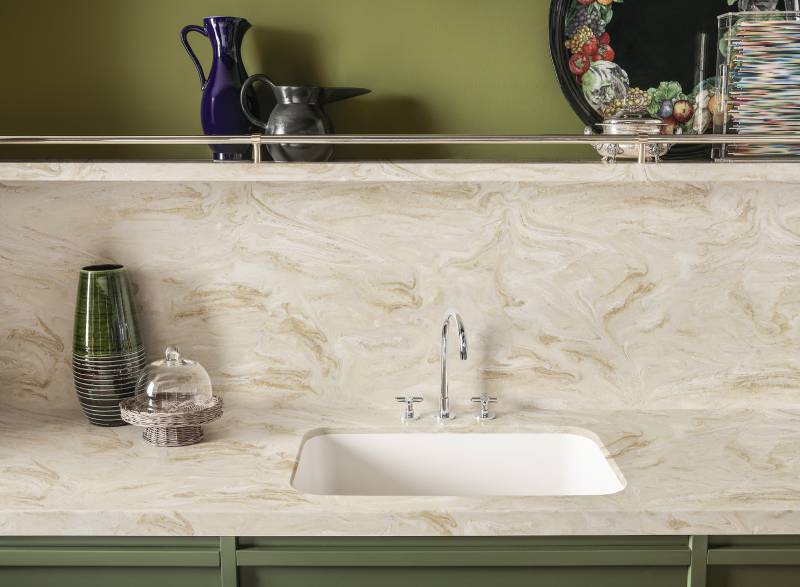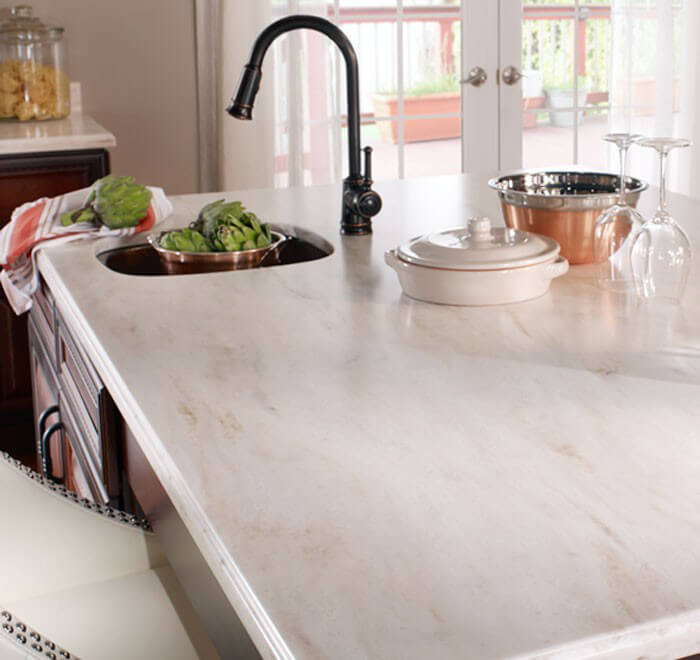Many people ask me about Corian countertops as an option for their kitchen, so I decided to write this article with pros and cons of this popular countertop type (solid surface).

What is a Corian kitchen countertop?
Because high-end materials like granite are too costly for many homeowners seeking to put into place countertops that look elegant but don’t cost a fortune, DuPont Corporation researchers invented a new type of material as a replacement for granite, marble and other high-end materials. They named it Corian before introducing it to the market back in 1971.
Considered the first solid-surface material designed for countertops, DuPont’s patent for Corian expired in 2003.
This opened the door to other companies eager to replicate this popular material. You likely recognize some of these names: Swanstone, Formica and Wilsonart.
But Corian remains the most well-known product of its kind on the market, which is why DuPont continues to expand the line so you don’t have to settle for only a Corian countertop.
What is Corian Made of?
Corian countertops may be fabricated of acrylic polymer and alumina trihydrate or some combination of epoxide, polyester resins, pigments and filler materials extracted from natural bauxite.
In concert, these raw materials produce a cross between laminate and granite. This mix of raw materials is liquified and then poured into molds to harden.
Once cured, countertop sections are removed from the molds and then distributed to retailers and wholesalers.

Because Corian is formulated of a mix of raw, refined materials, the newest versions of Corian countertops can be produced in a wide variety of shapes, though the most often form it takes is sheets or slabs.
Shoppers also have a choice of thicknesses that range between 0.25- and 0.75-inches. While the thinner option is more affordable, the thicker type is more durable.
Given the eclectic mix of ingredients used to fabricate Corian, every sheet is unique based on the ratio of raw materials and colors used.
The one commonality you are likely to find is a speckled appearance that mimics the look of granite. A major advantage of Corian is that counter sections can be made and then glued together using a solvent that make seams vanish so finished countertops appear to be seamless once the glue dries.
Let’s now discuss some advantages and disadvantages of this solid-surface countertop type:
Main Pros of Corian Countertops
- -Durable
- -Excellent stain and moisture resistance
- -Easy cleaning and maintenance
- -Wide variety of color and design options
- -Repairable if damaged
- -No sealing required since Corian is non-porous
- -Won’t react to acidic materials
- -Easier to work with and to install
- -Much less expensive than natural stone
- -The latest version can be illuminated!
- -You can match up countertop, sink and drainboard.
Main Cons of Corian Countertops
- -Easily damaged by hot pots and extreme heat
- -May not meet your criteria for natural looking
- -Can be scratched and dented if abused
- -Could appear boring or cheap-looking
- -Won’t add resale value to a home like granite
- -Granite can last 50 years; Corian life is around 30
- -Corian warranties only last around 10 years
- -Can become discolored if the wrong cleaners are used.
How much does it cost to install Corian countertops?
Among the original ideas behind creating Corian products had to do with cost cutting as an alternative to installing granite, quartz and marble.

On average, you can expect to spend around $35 per square foot for the Corian countertop material alone and anticipate paying between $45 and $65 per square foot for the install, a figure mirrored by Home Advisor experts who ballpark the entire cost of the install at about $3,500.
These estimates are for bare bones jobs that exclude bells and whistles currently available. For example, color complexity, unique countertop configurations, bar tops, sink mounts, drainboards, inlays plus an illuminated version of Corian that allows you to charge devices without having to plug them into a wall socket all add material and labor costs to the job.
Opt for a complicated Corian design or fabrication and you can easily expend between $100 and $130 per square foot, just for the material.
Does color factor into cost?
It can. For example, “An Abalone counter measuring 30- x 144- inches is about $870, or $30 per square foot,” say the folks posting figures on the Home Advisor website.
“A piece of the same size in Acadia is $550, or $20 per square foot. A smaller piece in Acorn measuring 30- x 92-inches is $400, or about $22 per square foot.”
As you can see, Corian is endlessly versatile, offering myriad choices that suit all budgets, too.
Add additional labor costs if you intend to undertake a complex install undertaken by a specialist, but you will appreciate this good news: You will still pay between 10- and 20-percent less for a contractor than you would were you having granite or marble installed.
Get bids from authorized Corian professionals and independent contractors to negotiate the best deal, keeping this in mind: Corian comes with a reputation of being the best solid-surface brand on the market with a long history of quality.
How to clean and maintain solid-surface countertops like Corian
Low maintenance? Oh, yes. Soapy water makes an ideal cleaning agent – just as long as you remember to give all of the surfaces a clear water rinse to remove dull film that can build up over time.
Cleaning products that are formulated especially for solid surfaces are also good choices and because Corian is so tough, you can work with abrasive cleaners, scouring and scrub pads for stubborn areas.
But don’t overdo it, say experts on the topic of the care of Corian. Prolonged exposure to bleach over time can discolor countertops and if you turn to window cleaning formulas, a waxy film residue could result.
Bottom line is that while solid-surface countertops like Corian are tough and resilient, playing it safe by using only pH neutral cleaners manufactured for granite and other natural stone will always give you the best cleaning result.
Maintenance over time could include having to attend to dents and scratches that can be costly because the work to restore these surfaces is rather labor intensive.
Rehab may involved buffing out damage with sandpaper and then filling the area(s) with a color-matched or clear epoxy.
Professional restoration, say Home Advisor experts, could run between $200 and $500, depending upon how extensive the damage is.
Tips to avoid situations that can damage Corian
One authority on the care and maintenance of Corian countertops and other materials in this product niche called high heat and hot pots and pans “kryptonite to Corian,” and you don’t have to know a lot about comic strip characters like Superman to understand the damage this fictional material can inflict on the man or the countertop.
Heat isn’t the only reason that Corian countertops can sustain damage. Grit that adheres to the bottoms of pots and pans can wind up damaging the countertop by causing the surface to suffer thermal shock which has the potential to crack the surface.
Additionally, darker colors used to craft Corian countertops often require more attention than lighter colors, but even with the best of care, time remains a constant in terms of wear.
Eventually, your countertop will acquire a “patina” that develops so subtly, you may not even notice that change in the finish as years go by.
A final tip on Corian countertop care and maintenance: Despite being tough, if you accidentally spill boiling water on your counter, clean it up fast.
Repeated exposure to boiling water could wear down the surface so gradually, you may not notice surface deterioration.
Avoiding chemicals like paint removers have the potential to stain surfaces if not mopped up immediately and always use a cutting board when chopping food so sharp knives don’t cut into the counter.
Don’t settle for countertops only if you’re enamored with Corian
Having come a very long way since that first Corian countertop was introduced to the public back in 1971, you’ll be interested in knowing how this company’s product line has expanded – especially if you’re a stickler for coordination.
The 100+ colors that are now available in addition to patterning, grains, textures, gloss and matte finishes have been joined by Corian products that include 20-percent recycled materials.
But it is your ability to match up edges, backsplashes and sinks now available in Corian that are sure to give your kitchen a designer edge.
Add a matching Corian backsplash or request a single unit of Corian that includes the countertop and a backsplash for a seamless look.
Corian sinks are so sophisticated, you can choose from top and underneath mounting or have the sink fabricated into the countertop itself.
Everything you seek in an integrated kitchen design can be pulled off using Corian – including that illuminated charging station!
Curious about how this charging surface works? Learn more by visiting this page so when time comes to choose your counters, you are fully informed about all of the revolutionary new features that are being added to this company’s ever-growing line of products.
Image Credits: https://www.corian.com/
Resources
https://www.thespruce.com/corian-vs-granite-which-is-better-1822082
https://www.countertopspecialty.com/Corian-counter-tops.html
https://www.apartmenttherapy.com/chooosing-kitchen-countertops-147495
https://www.homeadvisor.com/cost/cabinets-and-countertops/corian-countertops/
https://www.corian.com/IMG/pdf/k-26840-corian-solid-surface-care-and-maintenance.pdf
Related Posts
- 11 Ways to Get Rid of Cooking Smells in a Small Apartment or House
- Comparison of Corian Countertops vs Laminate for Kitchens
- All About Fragranite Kitchen Sinks With Pros & Cons
- Comparison of Granite Composite Sink vs Stainless Steel
- How Much Does it Cost to Paint Kitchen Cabinets?
- What Color Granite Goes With Maple Wood Kitchen Cabinets?
Leave a Reply